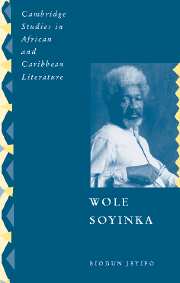Book contents
- Frontmatter
- Contents
- Preface
- Chronology
- List of abbreviations
- Chapter 1 ‘Representative’ and unrepresentable modalities of the self: the gnostic, worldly and radical humanism of Wole Soyinka
- Chapter 2 Tragic mythopoesis as postcolonial discourse – critical and theoretical writings
- Chapter 3 The “drama of existence”: sources and scope
- Chapter 4 Ritual, anti-ritual and the festival complex in Soyinka's dramatic parables
- Chapter 5 The ambiguous freight of visionary mythopoesis: fictional and nonfictional prose works
- Chapter 6 Poetry, versification and the fractured burdens of commitment
- Chapter 7 “Things fall together”: Wole Soyinka in his Own Write
- Notes
- Bibliography
- Index
Chapter 7 - “Things fall together”: Wole Soyinka in his Own Write
Published online by Cambridge University Press: 22 September 2009
- Frontmatter
- Contents
- Preface
- Chronology
- List of abbreviations
- Chapter 1 ‘Representative’ and unrepresentable modalities of the self: the gnostic, worldly and radical humanism of Wole Soyinka
- Chapter 2 Tragic mythopoesis as postcolonial discourse – critical and theoretical writings
- Chapter 3 The “drama of existence”: sources and scope
- Chapter 4 Ritual, anti-ritual and the festival complex in Soyinka's dramatic parables
- Chapter 5 The ambiguous freight of visionary mythopoesis: fictional and nonfictional prose works
- Chapter 6 Poetry, versification and the fractured burdens of commitment
- Chapter 7 “Things fall together”: Wole Soyinka in his Own Write
- Notes
- Bibliography
- Index
Summary
The Will of man is placed beyond surrender. Without the knowing of Divinity by man, can Deity survive? Oh hesitant one, Man's conceiving is fathomless; his community will rise beyond the present reaches of the mind. Orisa reveals destiny as SELF-DESTINATION
Wole Soyinka, “The Credo of Being and Nothingness”The very vocabulary of chaos – disintegration, fragmentation, dislocation – implies a breaking away or a breaking apart. But the defining thing of the Modernist mode is not so much that things fall apart but that they fall together.
James McFarlane, “The Mind of Modernism”In his important book, Forms of Attention, the English scholar and critic, Frank Kermode, has suggested that the fate of literature, the survival of literature, depends ultimately on the degree to which it continues to be talked about. Consistent with the title of the book, Kermode also makes the qualification that a lot depends, not just on literature continuing to get talked about, but also on how it is talked about, on the “forms of attention” that individual authors and entire literary traditions receive. The works and career of Soyinka amply demonstrate that it is also of significance who talks about literature or the corpus of a particular author with regard to its sources, impact and legacy.
- Type
- Chapter
- Information
- Wole SoyinkaPolitics, Poetics, and Postcolonialism, pp. 276 - 288Publisher: Cambridge University PressPrint publication year: 2003



